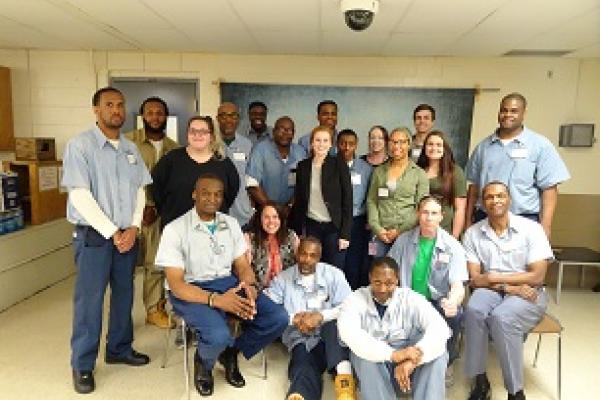Ohio Department of Rehabilitation and Correction's Southeastern Correctional Complex Think Tank hosts Participatory Action Research (PAR) Event

“Knowledge is the New Hustle”
Southeastern Correctional Complex (SCC) Think Tank hosts Participatory Action Research Scholar - Dr. Yasser Payne
For almost ten years, Dr. Angela Bryant, an associate professor of Sociology at The Ohio State University, has offered a course entitled “Corrections” to a group of students comprised of people incarcerated at SCC (or insiders) and traditional college students (or outsiders). This course follows a model developed by the Inside-Out Prison Exchange Program, an international network of faculty and institutions of higher education who partner with state and federal prisons. The capstone experience of Dr. Bryant’s course is a group project in which inside and outside students collaboratively design a policy proposal. Many of these projects focused on parole, and students consistently expressed a commitment to bring their policy recommendations to fruition. In response, an Inside-Out think tank was founded at SCC in January 2018. Twelve inside alumni and seven outside alumni from Dr. Bryant’s course meet on Tuesday nights in SCC’s visiting hall. Unlike other think tanks in Ohio, this group incorporates perspectives of people who are incarcerated and people who are not in an effort to transform all those affected by the prison system. This unique perspective is inspired by a few simple principles: 1) incarcerated people have invaluable insight into the challenges and solutions of incarceration and reentry; 2) justice-involved people will play a central role in any policy’s success; and 3) everyone inside and outside of prison is responsible for the justice and safety of our communities. In light of these principles, SCC’s think tank is called The Pantheon of Critical Criminologists (T-POCC). These principles also explain why T-POCC selected Participatory Action Research (PAR) as its methodology for its parole project. PAR is a collaborative process that builds evidence-based solutions to community-defined social problems. PAR research projects privilege the voices of those directly impacted by a social problem and empowers people to be catalysts for change. T-POCC spent its first few months designing its research program in light of PAR scholarship, which included generating research questions, identifying sources of evidence, and working on the necessary Institutional Review Board Applications for ODRC and OSU. On April 17, 2018, T-POCC hosted a PAR expert for a four-hour workshop at SCC. Dr. Yasser Payne is a social psychologist with a joint appointment in the departments of Sociology and Criminal Justice and Black American Studies at the University of Delaware. Dr. Payne implements innovative PAR projects in the city of Wilmington, where he has been able to partner with justice-involved people from the communities most affected by violence to conduct research projects and use the findings as a catalyst for community action and social change. Dr. Payne emphasized a basic value of PAR research: every person affected by the social problem in question should have an equal voice in each phase of the research program, from defining the problem to collecting and evaluating the data and to writing up the results. T-POCC observed the importance of this value and the unique challenges to realizing it in the context of prison. T-POCC will use the skills Dr. Payne provided to refine its proposal to ODRC for a PAR Parole project that aims to reduce prison populations in Ohio and keep communities safe.
